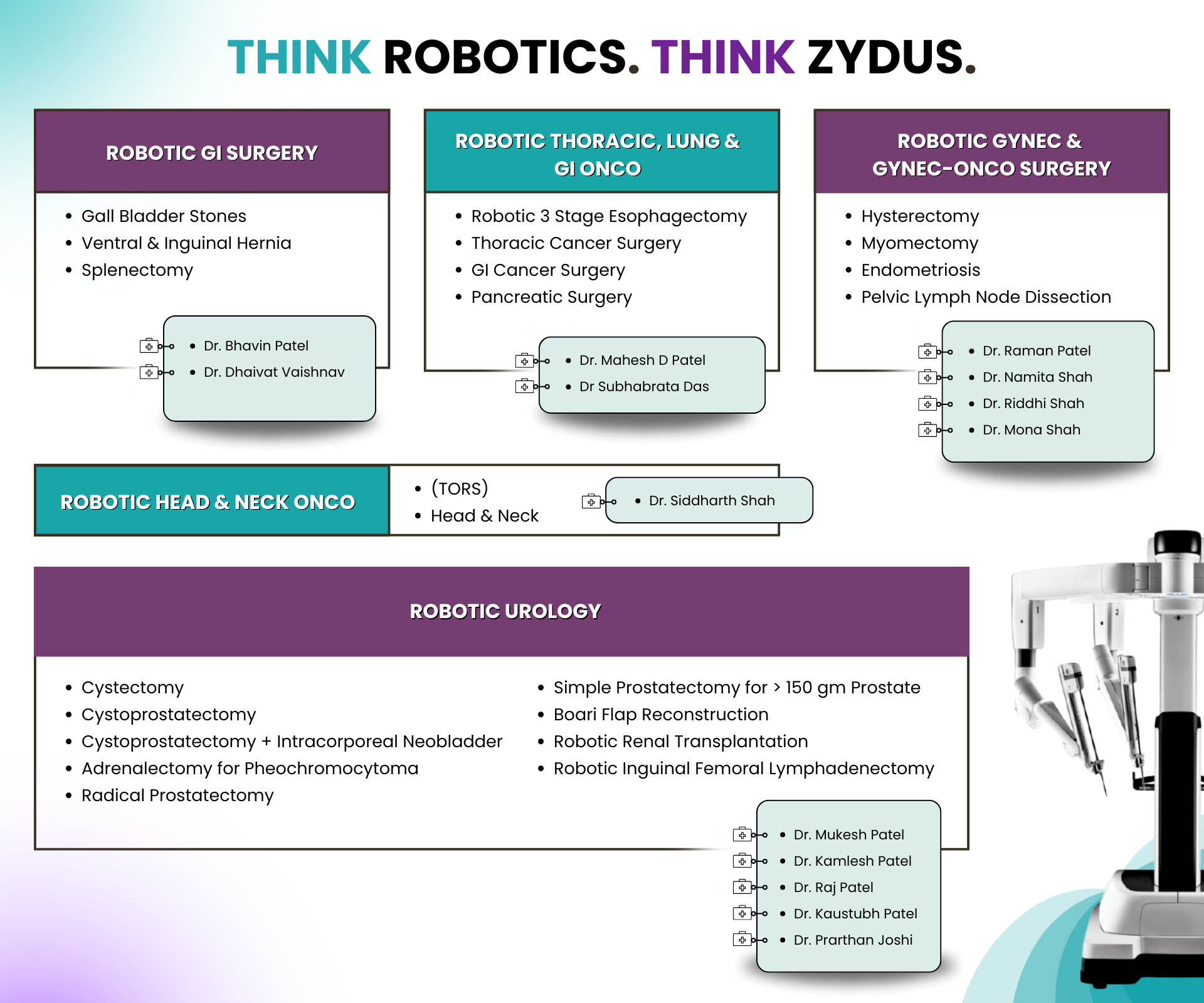
Prostate Cancer Treatment
- Medical Specialities
- Nephrology & Urology
- Prostate & Prostate Cancer
-
Expert-Led Prostate Cancer Treatment in India Using Modern Techniques
-
The prostate, a small gland beneath the bladder surrounding the urethra, can enlarge and obstruct urine flow. While benign prostate enlargement is common in men over 50, it can sometimes progress to prostate cancer, especially if left unchecked. Timely evaluation and treatment are crucial.
-
Zydus Hospitals provides the best prostate cancer treatment in India, combining diagnostics, medical management, and surgical expertise. From early detection to advanced intervention, our approach is designed for effective care and patient safety.
-
Symptoms and Diagnosis of Prostate Conditions
-
Symptoms of prostate-related conditions may overlap with benign or malignant disease and include:
-
Frequent or nighttime urination (nocturia)
-
Weak urine stream or difficulty initiating flow
-
Dribbling after urination
-
Sensation of incomplete bladder emptying
-
Recurrent urinary tract infection (UTI) in some cases
-
To distinguish benign prostate enlargement from malignancy, our diagnostic protocols include:
-
Digital Rectal Examination (DRE)
-
Prostate-Specific Antigen (PSA) blood testing
-
Urine flow studies
-
Cystoscopy, ultrasound, and MRI imaging
-
Biopsy and targeted MRI if prostate cancer is suspected

-
Early detection ensures timely intervention, especially in early-stage prostate cancer, which has a high survival rate.
-
Prostate Cancer Treatment Options
-
Treatment for Prostate Cancer is based on disease stage, patient health, and preferences. Our offerings include:
-
Surgical Options:
-
Radical prostatectomy (laparoscopic or robotic-assisted) for localized disease.
-
-
Radiation Therapies:
-
External-beam radiation and brachytherapy.
-
-
Additional Modalities:
-
Hormone therapy, chemotherapy, targeted therapies, and immunotherapy as appropriate for advanced or metastatic disease.
-
-
Surgical and Radiation Care Delivered with Precision
-
Patient pathways start with staging and individualized planning by urologists, radiation oncologists, and imaging specialists. Prostate cancer surgery at Zydus, whether open, laparoscopic, or robot-assisted, is performed with precision, minimizing complications and promoting quicker recovery.
-
International-Grade Prostate Cancer Care
-
Zydus is one of the best prostate cancer treatment hospitals in India, delivering care that integrates modern protocols, patient safety, and long-term follow-up. We implement national and international standards for oncology care, ensuring ethical practice and measurable treatment outcomes.
-
Early Diagnosis Means Better Outcomes
-
Since about 1 in 15 men receive a prostate cancer diagnosis and many cases are detected late, it is critical not to ignore early warning signs. With expert surgical and radiation care, prostate cancer treatment can be highly effective and curable in early stages.
-
If you notice prostate symptoms or have concerns about prostate cancer, early evaluation by a prostate cancer specialist is vital. Zydus Hospitals provides evidence-based diagnostic and treatment care suitable for your needs.

Search Doctor / Diseases
The Transplant Center of Gujarat
-
LIVER TRANSPLANT
-
200+ successful transplants done
-
A full-time dedicated team of 20+ members of Liver Transplant Surgeons, Hepatologists, Intensivists and Anaesthetists
-
Exclusive Class 100 Modular Liver OT and Liver ICU with strong infection control standards
-
KIDNEY TRANSPLANT
-
300+ successful transplants completed by the experienced and dedicated team of Senior Consultants in Nephrology and Urology
-
State-of-the-art 50 bed advanced Dialysis Centre with facilities for CRRT, SLED, HDF and CytoSorb
-
HEART TRANSPLANT
-
Highly experienced team of Heart Transplant Surgeons and Cardiologists
-
State-of-the-art infrastructure with exclusive Cardiac Critical Care Unit, ECMO Facility, Advanced Cath Lab and Left Ventricular Assist Device (artificial heart) Facility
-
BONE MARROW TRANSPLANT
-
200+ Haematopoietic Stem Cell Transplants at hi-tech BMT Unit
-
Highly experienced Haematologist, Intensivists and BMT-trained Staff, supported by Radiation Oncology Department with TBI treatment


